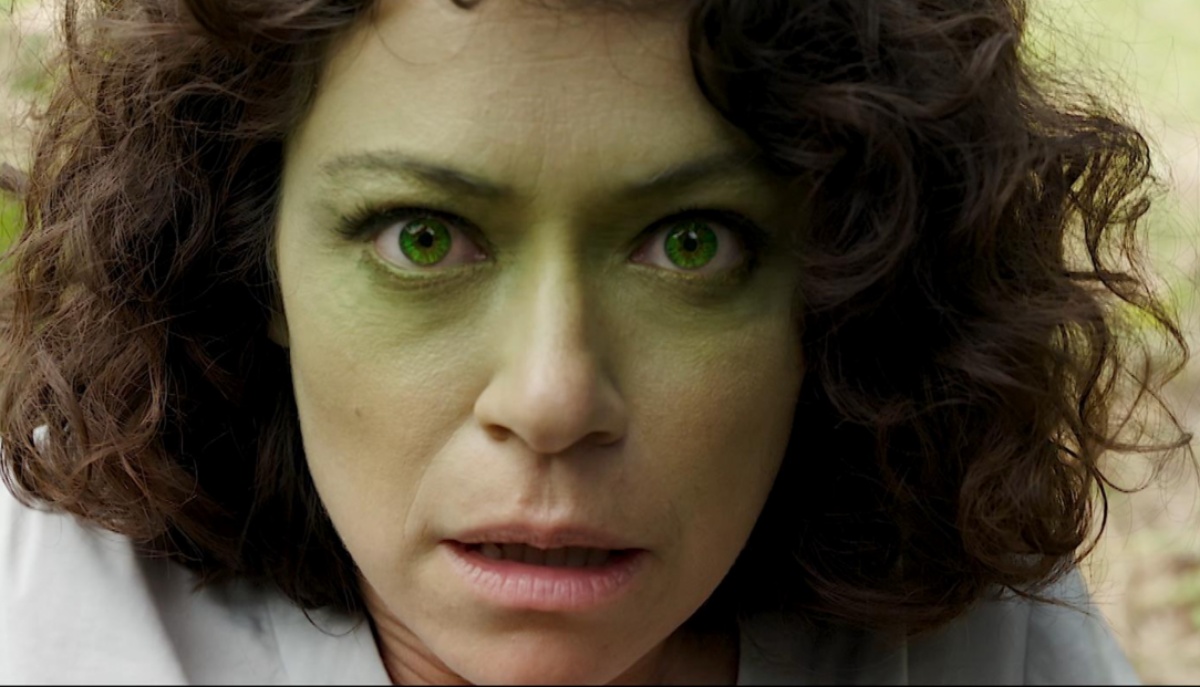Why Is the ‘She-Hulk: Attorney at Law’ Anger Scene So Divisive?

Disney+’s She-Hulk: Attorney at Law has been … divisive—in both the boring way that all female-led superhero products are and in good-faith criticism of how small the milestones have been for said female-led superhero works. One scene that has been much discussed is when Jennifer Walters (Tatiana Maslany) explains to her cousin Bruce Banner (Mark Ruffalo) why she is so good at controlling her anger—and her Hulk form.
For context, Jen has become a Hulk, and Bruce is in his Smark Hulk form, trying to help her control her newfound abilities. However, she’s already much further along than Bruce is. In the comics, it is because her Hulk mutation is milder than Bruce’s, but the TV series has chosen to make it slightly more “girl-boss,” which is … a choice. But whatever.
Bruce is talking about controlling anger, and Jen responds, “Well, here’s the thing, Bruce: I’m great at controlling my anger. I do it all the time. When I’m catcalled in the street, when incompetent men explain my own area of expertise to me. I do it pretty much every day, because if I don’t, I’ll get called ’emotional’ or ‘difficult,’ or might just literally get murdered. So I’m an expert at controlling my anger because I do it infinitely more than you!”
Director Kat Coiro explained to Total Film:
“I think the best way to drive things home is through humor and to not feel like we’re teaching everybody a lesson, but rather expressing something that is true in an engaging way that makes people think about it afterwards. The conversations about rage and what it means to be a woman walking through the world were front and center for all of us at the helm.
“What does it mean to be a woman walking down a dark alley at night? What does it mean to be a woman getting hit on at a bar by someone you have no interest in, but feel like you have to be polite because you’re scared for your safety? What does it mean that we have all this history of superheroes reaching rage level 10? What happens when our girl shows rage? How is that perceived by the world?’ These conversations were definitely a part of the show from its inception. But the fact that it’s a comedy and it’s entertaining, and all of this is explored through undertones is what I think makes it effective in showing people the world through the female lens.”
There have been three camps I’ve seen respond to this scene:
Camp One: Those who are glad that a male audience will get this perspective. It is good to see a woman discuss this candidly, even if it is pretty basic. It at least starts a conversation about what it feels like to operate in a world where you have to deal with sexist bullshit.
Camp Two: Sexists who don’t get that being catcalled can be dangerous. I’ve seen at least one man say that if being catcalled is the worst thing you deal with, that is a privilege. As someone who has been catcalled since they were twelve years old, I can tell you it doesn’t feel like a privilege, but thanks. Catcalling is not about attraction; it is about power, and while sometimes it can be flirty, many women and femme-presenting people are inherently anxious about it turning violent. The line from “damn, you are sexy” to getting called an “uppity bitch” is very, very thin.
Camp Three: Marginalized female-presenting folks who feel this dialogue feels weak when we have yet to see anything like this for WOC on trans women—who already barely exist in these fictional worlds. While this episode was written by Jessica Gao, who is of Chinese heritage, it does still feel frustrating. After that “Lady Avengers” team-up, it has been hard to see anything feminist from Disney in good faith.
Any progress they make (WandaVision) seems to change from film to film (Doctor Strange 2). As much as it is notable to have a white women share this experience, how often do we get the BIPOC perspective? The dual fear of being catcalled and feeling threatened, but also not wanting to call for help or the police because you don’t want the marginalized, unhoused person who did it be arrested (or worse, shot), you just want it to stop.
We barely see those perspectives, and with diversity still feeling like a catch-up at Marvel, it can be hard to see this as something worth celebrating when it can only be done through a white lead.
What did you think of the scene? Are you of the DLC Camp Four that just doesn’t care because it’s just a Marvel show?
(featured image: Disney+)
Have a tip we should know? tips@themarysue.com